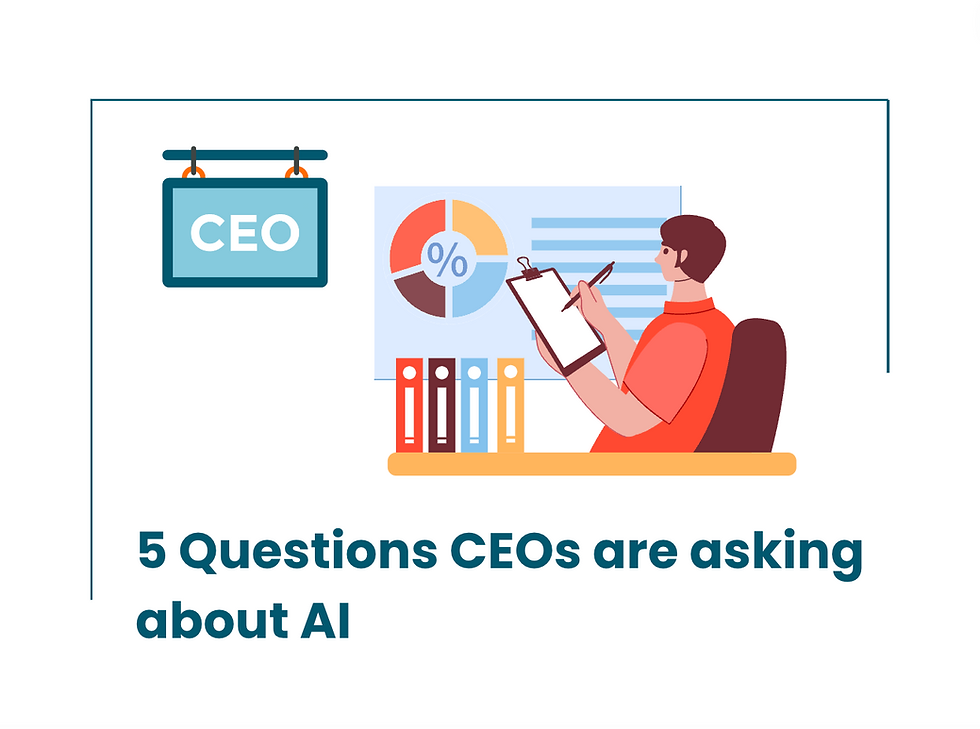
Contents

Artificial Intelligence is reshaping the way businesses operate, opening new avenues for growth and innovation. Today's business leaders are recognizing the value of AI, seeing it as much more than just another tool—it's becoming a core component of their strategy for success. The shift towards embracing AI is a game-changer, offering enhanced efficiency and a competitive edge.
With the latest announcements from OpenAI and Microsoft, leading AI developers are setting the tone that 2024 will be a pivotal year for AI innovation and broader accessibility for businesses. In January, OpenAI launched ChatGPT Team, so businesses of all sizes can unlock powerful enhanced ChatGPT features in a secure environment. Soon after the ChatGPT announcement, Microsoft launched Copilot for Microsoft 365 which makes Copilot AI features available to businesses of all sizes.
As we find ourselves in this era of technological advancement, it's essential for CEOs to ask the right questions and to stay current in the ever-changing AI environment. This understanding is key to effectively integrating AI into their businesses and tapping into its power to drive progress and innovation. Here is a list of 5 common questions CEOs are asking about AI today:
1. How can I help my team best adopt AI?
To ensure successful AI adoption, CEOs must pave the way, embodying the spirit of innovation and weaving AI understanding into the fabric of their leadership. Let education be the cornerstone, with immersive training and informational programs that introduce AI concepts, and highlight its cross-functional capabilities. This, in turn, will foster a culture of innovation where the exploration of AI solutions is rewarded and creates a safe environment for practice and integration. Lastly, it’s crucial to provide the necessary support for new AI software integrations, so team members are geared with the resources they need to succeed.

2. How can AI help my business and what problems can it solve?
AI can be a transformative asset for your business, enhancing a broad spectrum of operations and decision-making processes. By analyzing vast amounts of data far beyond human capability, AI can uncover insights to inform strategic decisions, identify market trends, and understand customer behaviors. It automates repetitive tasks, freeing up your workforce to focus on more complex, value-added activities. The scope in which AI can help your businesses today is also somewhat dependent on your industry. There are certainly some sectors like healthcare, technology, and finance that are early adopters and have experienced transformative AI applications. Artificial Intelligence is on a progressive trajectory, with emerging developments poised to accelerate productivity across all industries!
A prime use case for AI is in predictive analytics, where AI algorithms analyze large data sets to forecast trends, demand, and customer behavior with high accuracy. Retail businesses leverage this to optimize inventory management and personalize marketing strategies, while financial institutions employ it to assess credit risk and detect fraudulent activities. In the manufacturing realm, AI-driven predictive maintenance can anticipate equipment failures before they occur, minimizing downtime and extending machinery life. Similarly, healthcare providers use AI to predict patient outcomes, enhancing treatment plans and preventive care strategies. This adaptability of AI to analyze and predict across different data contexts demonstrates its capacity to drive efficiency and innovation in a multitude of business environments.
3. How can I implement AI in my business?
Embarking on the AI journey requires a keen eye for opportunities where technology can act as both a remedy and a catalyst within your business. Owners should initiate this by pinpointing precise areas where AI's capabilities align seamlessly with problem-solving. The most practical approach? Start small with a pilot project. This focused inception allows leaders to monitor AI's impact and fine-tune its application in a microcosm before expanding across the entire enterprise.
Implementing AI is a collaborative effort. Leaders can enlist a cross-functional team of IT experts, human resources, and departmental heads — all of whom stand to witness the impact of AI's integration into their workflows. Their collective insights are invaluable, ensuring that the technology not only coexists but thrives within the established ecosystem. It is also helpful to engage with an expert who specializes in AI and operations to gain valuable insights, tailor AI solutions to your unique business challenges, and ensure a smooth and effective integration without disrupting existing workflows.

4. What are the ethical considerations when using AI?
When we talk about integrating AI into our business operations, it's crucial to navigate the ethical landscape with care. Transparency is key; stakeholders need to understand how AI makes decisions, ensuring these processes don't become 'black boxes' with untraceable outcomes. Equally vital is the possibility of bias — AI systems must be meticulously trained to prevent the propagation of existing prejudices, promoting fairness and accurate information.
Privacy must be upheld with the utmost respect, as AI often deals with vast amounts of personal data. As AI software evolves, we’re seeing a lot of big players, like Open AI, launching plans that tend to business security needs, providing an extra layer of data protection. It's essential to have robust safeguards in place to protect this information and comply with global data protection regulations.
Lastly, we must consider the impact on the workforce; AI should be positioned as a tool to augment human skills, not replace them, fostering an environment where technology and talent grow together.
5. What is the future of AI, and how can I stay prepared?
As we look ahead, the future of AI holds the promise of profound transformations across various industries. To ensure leaders are well-prepared for this exciting journey, there are some actionable steps to consider. Firstly, keep your finger on the pulse of AI developments by staying updated through reliable sources, and exploring online courses that offer insights into the latest trends and breakthroughs. By doing so, you'll not only enhance competitiveness but also spark innovation in an increasingly AI-driven landscape. To prepare your organization for AI, leaders should consider fostering a culture of curiosity, innovation, and continuous learning to cultivate AI literacy.

AI represents a gateway to operational optimization and data-driven decision-making, offering businesses unparalleled potential for growth. CEOs must grasp the essentials of AI, not only to strategically select AI systems but to ensure effortless integration for teams. If you have specific AI questions, or you’re ready to get started on your AI journey, contact Louder Co. today.


